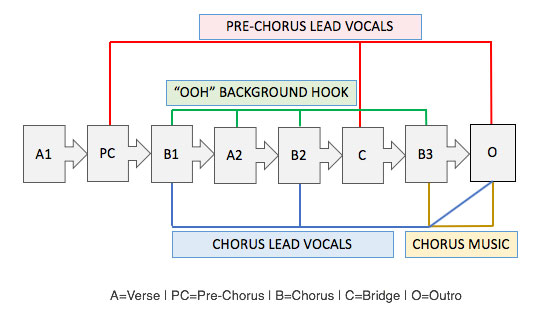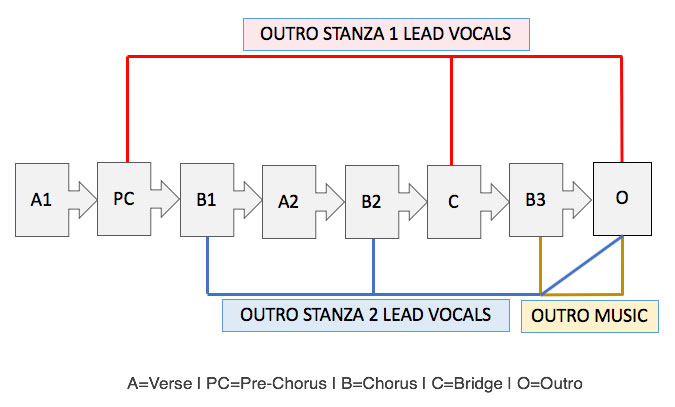A true mark of an expertly-crafted Pop hit is that it remains lingering in the listener’s head long after it’s ended. While there are a host of techniques that can be employed to achieve this, such as adhering to the K.I.S.S. ME principal (Keep It Simple, Singable, & Memorable), using effective rhyme schemes, and incorporating a plethora of hooks, some songs take it one step further by recycling lyrical, vocal, and/or musical material across sections. However, the trick is to do this in a methodical manner so that the song doesn’t become overly monotonous in the process.
A great example of a hit that pulls this off successfully is 5 Seconds Of Summer’s Youngblood. Co-written by members of 5SOS and an all-star team of hitmakers including Ali Tamposi, Andrew Watt, and Louis Bell, Youngblood repurposes material from multiple sections in fresh ways to help create a hit that remains engaging while ensuring that it gets firmly ingrained in the listener’s head.
.


Let’s begin with the pre-chorus. It fulfills the traditional role of a pre-chorus by musically, vocally and lyrically heightening tension and anticipation for the chorus that follows. However, it goes one step further by achieving all of this in a hook-based manner through the back-to-back line and phrase repetition, which makes it one of the most infectious and memorable sections in the song.
Lines: Vocal melody shape | A= Main melodic part | a,b,c= Sub melodic parts | Number= Scale degree
Fast-forwarding to the second verse, instead of following it with another pre-chorus, which is what the listener is most likely expecting to hear, the writers went against the grain and instead headed right into the second chorus. While omitting the second pre-chorus is atypical among Pop hits, getting to the second chorus earlier than expected certainly never hurts! In the pre-chorus’s absence, the writers did something clever by tacking the infectious “ooh” nonsense vocal hook, which had previously been featured at the end of both stanzas in chorus 1, onto the end of verse 2. This surprise development has three important implications – it heightens engagement due to its unexpected placement, it further reinforces the hook in the listener’s head, and, it cleverly foreshadows the chorus to come, acting as a substitute pre-chorus.
Throughout the rest of the song, there aren’t any additional pre-choruses to be found. However, because it’s far too infectious of a section to let go of completely, the writers recycled aspects of it in other song sections. In the bridge, the lyrics and melody from the pre-chorus are used but with a changed up instrumental accompaniment, chord progression, and an additional vocal line that advances the narrative while reinforcing the pre-chorus melody. As a result, the bridge provides an engaging departure while also heightening familiarity/memorability. Additionally, it provides a lead-in to the third and final chorus that follows. Now that’s effective sectional multi-tasking!
Following chorus 3, the outro employs a technique that we, at Hit Songs Deconstructed, like to call the “Grand Final Hook Fest.” This is where some of the most infectious material from multiple sections of the song is repurposed to heighten memorability and leave the listener on a high as the song comes to a conclusion
.
With the full instrumental accompaniment from the preceding chorus helping to keep energy and excitement at a high, the outro recycles the first two lines from the pre-chorus and bridge followed by the first three lines from the chorus. However, what’s NOT being recycled from the chorus is the “ooh” nonsense vocal hook. While a notable omission, it’s warranted considering the hook has already been heard at the end of each chorus stanza, as well as at the end of the second verse. If it was used here in the outro as well, it might start to become overly redundant and wear out its welcome with the listener.
Lines: Vocal melody shape | B,C,D= Main melodic parts | d,e,f,g= Sub melodic parts | Number= Scale degree
Together, the combination of pre-chorus, bridge and chorus material in the outro effectively reinforce some of the most infectious material with the listener while concurrently summing up the narrative in a fresh new way as Youngblood comes to a conclusion.
Youngblood’s clever and effective material recycling is just one of the many characteristics that helped it become a worldwide success. Be sure to check out the full Youngblood Deconstructed Report for a deep dive into the songwriting and production techniques used to craft this song.
To read this report Hit Songs Deconstructed subscribers can log in here. Not a subscriber? Click here.






